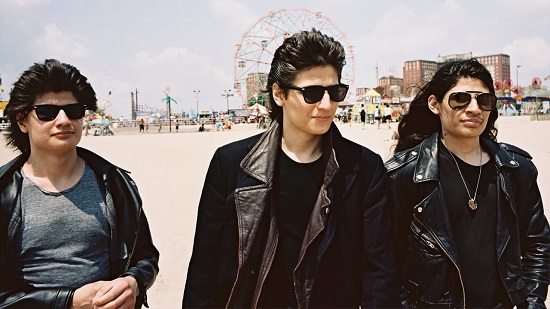What happens when you keep 6 boys in a small New York apartment and feed them on a diet of movies their entire childhood?
That’s the question behind The Wolfpack, a documentary showing the coming of age of a group of brothers who’ve been kept from the outside world for their entire lives. Born into a nomadic family that eventually settled in NYC, they were home-schooled, given Sanskrit names and encouraged to grow their hair long. The family’s apartment is in a bad part of town but the Dad has responded drastically to their circumstances, saying it’s like a jail outside and not even allowing the boys’ Mother to have a key. As one of them points out, the whole prison analogy works better for their confined existence.
The film follows these kids as they begin to challenge received wisdom. We are shown the first time one of the siblings went outside by himself and how soon after the floodgates opened and the rest of the clan spilled out, often en masse in some quite extraordinary outfits. Think Reservoir Dogs with a touch of The Godfather thrown in. It’s no surprise they first met director Crystal Moselle after she caught sight of all six of them walking down the street, all shades and flowing long hair. Did the movies give them the confidence to eventually defy authority and go outside, in the guise of their favourite characters?
If watching movies helped them go out into the world, it also meant they had no idea how it works. Jean-Luc Godard explored this territory in his early films, where young characters come unstuck by confusing real life for action flicks: Bande à Part for example, shows the tragic consequences of a bunch of youngsters who see themselves in the role of Billy the Kid. In The Wolfpack the boys’ massive exposure to movies, and little exposure to life, becomes apparent when they start to think someone is following them down the street. The alpha of the group, clad in a shirt and tie and speaking in Mafia drawl, defiantly says he’s never going to listen to the advice of the local charity that’s encouraging him to go to school.
The Wolfpack is the director’s début, and she delivers an ethnographic-style film about this ‘pack’ of brothers. They are treated as a group rather than as individuals, with no title cards for us to identify them by. The Dad supposedly liked the idea of having his own ‘tribe’ and the film is a post-mortem of his – for want of a better word – experiment. It’s an urban twist on the familiar theme of an untouched, pristine community. Documentaries working in this vein, like 2012’s The Village At The End Of The World, usually show the encroachment of civilisation on an isolated society. Here though, we see a group straining at the leash to get into the wider world.
Still, The Wolfpack isn’t cerebral. It’s like a journalistic scoop that’s been given room to breathe. Could there have been a tighter focus on how the movies prepared these kids for life? They must be almost unique in having seen the world refracted through films before experiencing it firsthand and it seems a shame that it was left to ABC news to pick up on this point. What we do get from the documentary, though, is clear and affectionate storytelling which doesn’t push its point of view on the audience. It would have been easy, for example, to portray the father in a more unflattering light but, in the style of the best ethnographic films, the Wolfpack simply documents an intriguing, unusual reality as well as its evanescence.
The Wolfpack is out now



